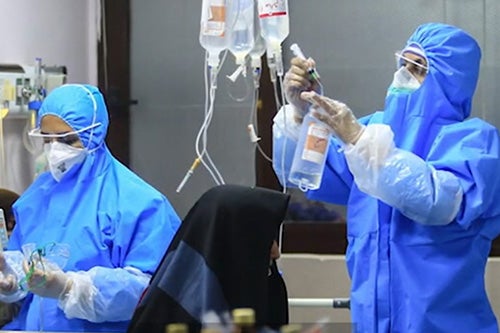UNITED NATIONS, New York – As the COVID-19 pandemic rages around the world, governments are taking unprecedented measures to limit the spread of the virus, ramping up health system responses and announcing movement restrictions affecting millions. But amid these efforts, policymakers must not lose sight of the vulnerabilities of women and girls, which have been exacerbated by the crisis, says a UNFPA guidance note released today.
COVID-19, the coronavirus disease that has rapidly spread around the world since it was discovered late last year, appears most deadly among elderly populations and people with pre-existing medical conditions. Accurate and complete sex-disaggregated data are still needed to understand whether and how women and men experience infection, complication and death risks differently.
Yet even now, it is clear that women and girls face a variety of risk factors that must urgently be addressed.
“Disease outbreaks affect women and men differently,” says the new UNFPA guidance document, which covers how gender is playing a role in the unfolding pandemic. “Pandemics make existing gender inequalities for women and girls worse, and can impact how they receive treatment and care.”

Women are a majority of the global health-care and social service workforce. Image courtesy of UNFPA Iran
Women on the front lines
Women may face heightened risk of exposure to COVID-19 due to their disproportional representation among health-care and social service personnel. Around the world, around 70 per cent of health and social service workers are women. Many are midwives, nurses or community health workers, roles that place them on the front lines of any disease outbreak.
Risks to women and girls also increase if health systems divert resources from sexual and reproductive health care to respond to the epidemic, and if supply lines begin to creak under the strain of the pandemic.
Sexual and reproductive health services and commodities are often overlooked in times of crisis, yet women continue to require family planning, menstrual health supplies and maternal health care. Already, countries have seen health systems forced to allocate staff and resources towards critical care services and away from other areas of care.
It is a particularly worrying time for women who are pregnant and in need of routine health services. Infection control measures must be taken to protect women in antenatal, neonatal and maternal health units, the guidance note says.
Pregnant women also need access to reliable information and quality care.
“To date, there is no evidence that pregnant women are at higher risk of severe illness from COVID-19 or present with different symptoms,” said UNFPA Executive Director Dr. Natalia Kanem. "It is important to ensure that all pregnant women with a suspected, probable or confirmed COVID-19 infection continue to have access to the full range of quality health care. Pregnant women with respiratory illnesses must be treated with the utmost priority due to increased risk of adverse outcomes.”
Risk of violence, affected livelihoods
The pandemic has also given rise to threats that extend beyond the risk of infection. Evidence from previous disease outbreaks reveals that women and girls face particular vulnerabilities.
In the 2015-2016 Zika outbreak, women faced significant barriers to health care due to lack of autonomy over their own sexual and reproductive health, inadequate access to health services, and insufficient financial resources. During the 2014-2016 West African Ebola outbreak, women were more likely to be infected due to their predominant roles as caretakers and health workers.
Today, the coronavirus pandemic could exact a significant toll on women’s livelihoods, as school closures increase the burden of domestic care that typically falls to women, and as travel restrictions affect service industries and informal labour dominated by female workers.
Epidemics and their attendant stresses can also increase the risk of domestic abuse and other forms of gender-based violence. The economic effects of the Ebola outbreak, for instance, led to exacerbated sexual exploitation risks for women and children. Today, as families face heightened tensions, financial uncertainties and other pressures, women and girls face intensified vulnerabilities.
UNFPA urges policymakers to include women’s perspectives in pandemic planning and decision-making. Health systems are also urged to be prepared to provide essential support to survivors of gender-based violence.
“All these survivors need to access protection and health services even in the midst of community quarantines,” said Aimee Santos, a UNFPA gender expert working in the Philippines, where the organization is working with Government health services on the pandemic response.
Working together
All of these vulnerabilities are exacerbated in humanitarian settings. “For the nearly 48 million women and girls, including 4 million pregnant women, identified by UNFPA as in need of humanitarian assistance and protection in 2020, the dangers that COVID-19 outbreaks pose will be magnified,” the guide says. It calls for humanitarian action plans to account for the need to respond to the pandemic.
In addition to advocating for gender-sensitive responses, UNFPA has been providing material support to affected health systems.
In China, UNFPA has distributed sanitary napkins and adult diapers for vulnerable populations, including at-risk elderly persons, as well as personal protective equipment for health workers. In Iran, UNFPA has acquired supplies such as masks, disinfectants and gloves for health workers.
In the Philippines, UNFPA recently provided personal protective equipment – including coveralls, long-sleeve gowns, face shields, eye goggles, aprons, head covers, and shoe covers – to frontline health workers. These supplies supplement an earlier distribution of hand-held thermometers and surgical masks.
“It is imperative that we support [the Department of Health] and all the heroes of this country today – all the people working in the health sector, especially the front-liners risking their health and safety to respond to this emergency. They need to be protected from infection,” said Dr. Joseph Michael Singh, a UNFPA health expert in the Philippines.


